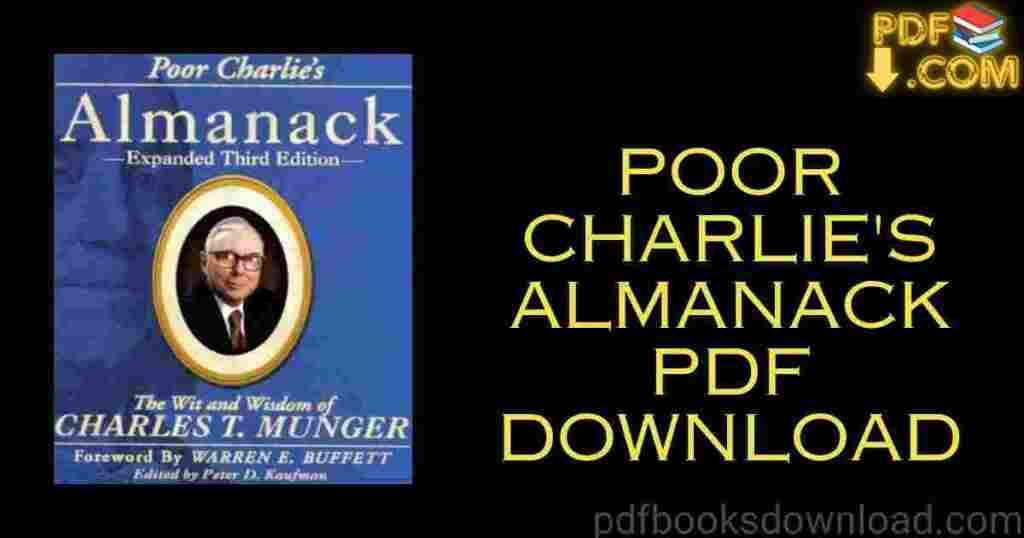| Name of Book | Poor Charlie’s Almanack |
| Author | Charles T. Munger |
| PDF Size | 2.2 MB |
| No of Pages | 618 |
| Language | English |
Five Reasons To Read Poor Charlie’s Almanack PDF
1.Insights from a Wise Investor: Charlie Munger, as Warren Buffett’s business partner and vice-chairman of Berkshire Hathaway, offers invaluable insights into investing, business, and life. His wisdom can help readers navigate the complexities of the financial world.
2.Practical Advice: Munger provides practical advice on various topics, including decision-making, mental models, and human psychology. These insights can be applied not only in investing but also in everyday life and business situations.
3.Diverse Range of Topics: The book covers a wide range of topics beyond investing, such as economics, psychology, ethics, and philosophy. This diversity makes it a rich source of knowledge for anyone interested in personal development and intellectual growth.
4.Engaging Writing Style: Munger’s writing style is engaging and accessible, making complex ideas easy to understand. Whether you’re a seasoned investor or a novice, you’ll find his insights both enlightening and entertaining.
5.Timeless Wisdom: Despite being published years ago, the principles and lessons in “Poor Charlie’s Almanack” remain relevant today. Munger’s timeless wisdom transcends market trends and economic cycles, making it a valuable resource for readers seeking enduring knowledge.

Poor Charlie’s Almanack Summary
Introduction
Poor Charlie’s Almanack is not just a book; it’s a treasure of wisdom, distilled from the brilliant mind of Charlie Munger, Warren Buffett’s esteemed partner at Berkshire Hathaway. This guide gives deep advice on life, business, and investing, helping readers find success in different areas of their lives.
Key Principles:
The Multidisciplinary Approach:
Charlie Munger advocates for the multidisciplinary approach, encouraging individuals to expand their knowledge across various disciplines such as psychology, economics, and physics. By integrating insights from diverse fields, one can develop a more comprehensive understanding of the world and make better decisions.
Elementary,Worldly Wisdom:
Munger emphasizes the importance of developing elementary, worldly wisdom, which involves accumulating a repertoire of mental models and using them to analyze and solve problems. This approach enables individuals to navigate complex situations with clarity and insight.
Inversion:
Instead of focusing solely on how to achieve success, Munger advises considering the inverse—identifying and avoiding the pitfalls and mistakes that lead to failure. By practicing inversion, individuals can enhance their decision-making and minimize risks.
Margin of Safety:
Drawing from Benjamin Graham’s principles of value investing, Munger stresses the importance of maintaining a margin of safety in investments. Investors can safeguard themselves against unexpected risks and market downturns by acquiring assets at a substantial discount compared to their intrinsic value.
Circle of Competence:
Munger advises individuals to stay within their circle of competence—the areas where they have expertise and understanding. By avoiding ventures outside their circle of competence, individuals can mitigate the risk of making ill-informed decisions.
The Psychology of Misjudgment:
Munger explores the various cognitive biases and psychological pitfalls that influence human decision-making. By understanding these biases, individuals can become more aware of their own thought processes and make more rational choices.
Preparation and Patience:
Munger underscores the importance of thorough preparation and patience in achieving long-term success. By diligently researching opportunities and exercising patience, individuals can capitalize on favorable situations and weather inevitable setbacks.
Application in Real Life:
Continuous Learning:
Embrace the multidisciplinary approach by actively seeking knowledge from diverse sources such as books, podcasts, and online courses. Cultivate a curious mindset and never stop learning.
Critical Thinking:
Develop elementary, worldly wisdom by honing your critical thinking skills and adopting a rational, evidence-based approach to problem-solving. Question assumptions, consider alternative perspectives, and seek out reliable sources of information.
Risk Management:
Practice inversion by identifying potential risks and devising strategies to mitigate them. Conduct thorough research before making decisions, and always have a backup plan in place.
Investing Wisely:
Apply the principles of value investing by conducting thorough fundamental analysis and seeking out undervalued assets with a margin of safety. Diversify your portfolio to spread risk and focus on long-term wealth creation rather than short-term gains.
Know Your Limits:
Recognize your circle of competence and avoid overextending yourself into areas where you lack expertise. Seek advice from trusted mentors or professionals when venturing into unfamiliar territory.
Emotional Intelligence:
Be mindful of the psychological biases that can cloud your judgment and lead to irrational decision-making. Practice self-awareness and emotional regulation to make more informed and objective choices.
Persistence and Resilience:
Cultivate patience and perseverance in pursuing your goals. Success often requires time and effort, so stay committed to your vision and remain resilient in the face of adversity.
Conclusion
In Conclusion Poor Charlie’s Almanack is a timeless guide for navigating the complexities of life and investing. By embracing its key principles and applying them in real life, individuals can cultivate wisdom, make better decisions, and ultimately achieve success on their own terms. For More Information Click

About The Author Of Poor Charlie’s Almanack
Charlie Munger, the author behind “Poor Charlie’s Almanack,” is not just a name; he’s a beacon of wisdom in the world of investing and life philosophy. Born on January 1, 1924, in Omaha, Nebraska, Munger’s journey from humble beginnings to becoming one of the most respected figures in finance is nothing short of remarkable.
Growing up during the Great Depression, Munger learned the value of hard work and perseverance early on. He displayed an insatiable curiosity and an appetite for knowledge that would shape his future endeavors.Following his service as a meteorologist in the U.S. Army Air Corps during World War II, Munger enrolled in Harvard Law School, where he refined his analytical abilities and cultivated a strong passion for investing.
In the 1950s, Munger met Warren Buffett, a fateful encounter that would alter the course of both their lives. The two shared a common investment philosophy grounded in rationality, patience, and a long-term perspective. Munger became Buffett’s closest confidant and business partner, playing a pivotal role in the success of Berkshire Hathaway, the multinational conglomerate they would later helm together.
Despite his success in the world of finance, Munger is not merely a numbers man. He is an avid reader with a deep appreciation for multiple disciplines, including psychology, economics, and history. His broad knowledge base has earned him the nickname “the abominable no-man” for his ability to spot flaws and pitfalls that others overlook.
In “Poor Charlie’s Almanack,” Munger shares his insights on a wide range of topics, from investment principles to human behavior. The book serves as a compendium of Munger’s wisdom, distilled from decades of experience and observation. It offers readers a roadmap for achieving success and fulfillment in both their personal and professional lives.
Munger’s approach to investing is characterized by a focus on value, patience, and discipline. He emphasizes the importance of rationality and independent thinking, urging investors to avoid the herd mentality and make decisions based on careful analysis rather than emotion.
Beyond investing, Munger’s philosophy extends to life itself. He advocates for the cultivation of virtues such as integrity, humility, and perseverance, believing that true success is not just measured in financial terms but in the impact one has on the world and the relationships one builds along the way.
In addition to his work with Berkshire Hathaway, Munger is also a philanthropist, supporting causes related to education, healthcare, and poverty alleviation. He believes in using wealth as a force for good and has donated generously to institutions such as the University of California, Santa Barbara, where he serves as a trustee.
Despite his advanced age, Munger remains active and engaged, continuing to share his wisdom through speeches, interviews, and writings. His influence extends far beyond the world of finance, inspiring countless individuals to strive for excellence and lead lives of purpose and meaning.
In conclusion, Charlie Munger’s journey from a small-town boy to a titan of industry is a testament to the power of intellect, integrity, and perseverance. Through his work and writings, he has left an indelible mark on the world, shaping the way we think about investing, business, and life itself. “Poor Charlie’s Almanack” stands as a timeless tribute to his enduring legacy.
Poor Charlie’s Almanack PDF Related Books
The Richest Man In Babylon PDF George S. Clason Free Download
FAQ’s About Poor Charlie’s Almanack

What is “Poor Charlie’s Almanack” about?
“Poor Charlie’s Almanack” is a collection of Charlie Munger’s speeches, essays, and other writings on topics ranging from investing and decision-making to psychology and life philosophy.
Who is Charlie Munger, and why is he significant?
Charlie Munger is the vice chairman of Berkshire Hathaway, the conglomerate led by Warren Buffett. Munger is known for his wit, wisdom, and unconventional thinking in the world of investing and business.
What are some important concepts talked about in the book?
The book covers various key concepts, including the importance of multidisciplinary thinking, the role of mental models in decision-making, the power of incentives, and the benefits of patience and rationality in investing.
Is “Poor Charlie’s Almanack” suitable for beginners in investing?
While the book can be challenging for beginners due to its depth and breadth, it offers valuable insights for anyone interested in improving their decision-making skills, whether in investing or other areas of life.
Are there any specific investment strategies or tips mentioned in the book?
Munger doesn’t provide specific investment advice or strategies in the book. Instead, he emphasizes the importance of developing a rational and disciplined approach to decision-making based on sound principles and mental models.
What sets “Poor Charlie’s Almanack” apart from other books on investing?
Unlike many traditional investment books that focus solely on financial analysis and techniques, “Poor Charlie’s Almanack” offers a holistic view of decision-making, drawing from various disciplines such as psychology, economics, and biology.
How can people apply the learnings given in the book in their daily lives?
Readers can apply the lessons from the book by incorporating Munger’s principles into their decision-making processes, practicing critical thinking, seeking out diverse perspectives, and continually learning from their experiences.
Is “Poor Charlie’s Almanack” only for investors, or can anyone benefit from reading it?
While the book has a strong emphasis on investing, its insights are applicable to anyone seeking to make better decisions and navigate life’s challenges more effectively, regardless of their profession or background.
Are there any criticisms of “Poor Charlie’s Almanack”?
Some critics argue that the book’s content can be dense and challenging to digest, particularly for readers who are not familiar with Munger’s style of thinking or the topics he discusses.
Thank You! Dear Reader 💖
